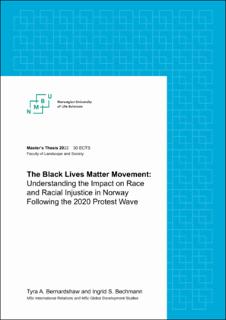| dc.contributor.advisor | Sommerville, Melanie | |
| dc.contributor.advisor | Nyborg, Ingrid Louise Peck | |
| dc.contributor.author | Bechmann, Ingrid Solberg | |
| dc.contributor.author | Bernardshaw, Tyra Ashwini | |
| dc.coverage.spatial | Norway, Oslo | en_US |
| dc.date.accessioned | 2022-12-08T09:19:59Z | |
| dc.date.available | 2022-12-08T09:19:59Z | |
| dc.date.issued | 2022 | |
| dc.identifier.uri | https://hdl.handle.net/11250/3036664 | |
| dc.description.abstract | The Black Lives Matter movement rose as a force against the oppression and systematic violence of black people in the US but spread to become a worldwide movement with local adaptations. While it had existed for some years
before 2020, the killing of George Floyd in Minneapolis on May 26 sparked a renewed anger and frustration among people around the world. Norway experienced a protest wave in the summer of 2020, which attracted and engaged youth of minority background, in particular, to participate.
This study aims to investigate the extent to which the Black Lives Matter protest wave has had an impact on the current discussion about race and racial injustice in Norway by examining the role of minority youth in Norwegian society. The objective of the study is to deepen the understanding of racialized experiences by lifting the voices of people who have experienced racism or racial injustice, as well as to demonstrate whether the Black Lives Matter protest wave has had any value on the ongoing conversation about racism in Norway. Thus, the main research question that this study has attempted to answer is: How has the Black Lives Matter movement in Norway made an impact on the conversation around race and racial injustice in Norway?
Our study suggests that the BLM protest wave has had a significant impact on the conversation around race and racial injustice in Norway, particularly by how it introduced a wider understanding and nuances to the comprehension of racialized experienced, as well as it increased the overall knowledge among the general population of what it is like to be a minority in Norway. It has had a noteworthy impact on minority youth’s role in Norwegian society because they experienced having more space in the public room to share their experiences and perspectives, and a reduced fear of voicing their opinions. Lastly, our study demonstrates that there is a considerable lack of trust among minority youth towards the police, primarily because they feel targeted and unfairly treated by law enforcement, based on first or secondary negative experiences with the police. | en_US |
| dc.language.iso | eng | en_US |
| dc.publisher | Norwegian University of Life Sciences, Ås | en_US |
| dc.rights | Attribution-NonCommercial-NoDerivatives 4.0 Internasjonal | * |
| dc.rights.uri | http://creativecommons.org/licenses/by-nc-nd/4.0/deed.no | * |
| dc.subject | Black Lives Matter movement | en_US |
| dc.subject | Social movement | en_US |
| dc.subject | Protest wave | en_US |
| dc.subject | Racism | en_US |
| dc.subject | Discrimination | en_US |
| dc.subject | Policing | en_US |
| dc.subject | Ethnic profiling | en_US |
| dc.subject | Minority youth | en_US |
| dc.subject | Racial injustice | en_US |
| dc.title | The Black Lives Matter movement : understanding the impact on race and racial injustice in Norway following the 2020 protest wave | en_US |
| dc.type | Master thesis | en_US |
| dc.subject.nsi | VDP::Samfunnsvitenskap: 200 | en_US |
| dc.description.localcode | M-DS | en_US |
| dc.description.localcode | M-IR | en_US |

